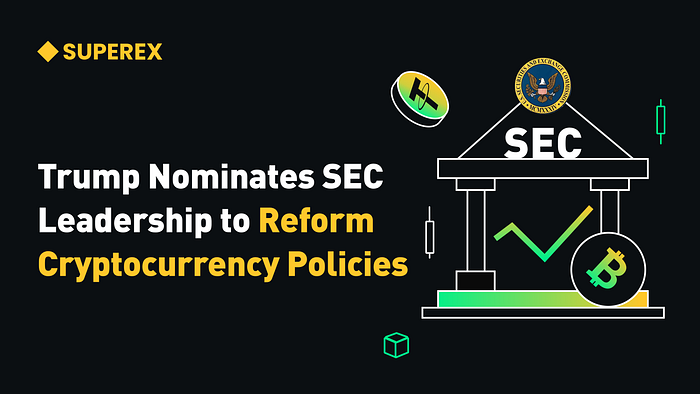SuperEx丨Trump Nominates SEC Leadership to Reform Cryptocurrency Policies

#SuperEx #Trump #SEC
According to reports, Trump has selected digital asset advocate and seasoned financial regulator Paul Atkins as the next chairman of the U.S. Securities and Exchange Commission (SEC). The current chairman, Gary Gensler, is set to step down on January 20, 2025.
The announcement sent the cryptocurrency market higher in the short term, with major assets like Bitcoin and Ethereum rising by 3.2% and 4.5%, respectively.
Gary Gensler’s tenure has been marked by strict regulatory policies, which created friction with both Wall Street and the crypto industry. In contrast, Paul Atkins is known for his belief in a balanced and innovative capital market that meets investor needs while driving economic growth. He also recognizes the crucial role of digital assets and other innovations in maintaining America’s global economic leadership.
Atkins is expected to review several rules and enforcement actions implemented under Gensler’s administration. His approach toward cryptocurrencies is anticipated to be more lenient, focusing on reforms that foster capital formation and innovation.
- Click to register SuperEx
- Click to download the SuperEx APP
- Click to enter SuperEx CMC
- Click to enter SuperEx DAO Academy — Space

Why Did the Crypto Market React Positively?
Policy changes have a significant impact on the cryptocurrency market. Here are the key reasons why the nomination of Paul Atkins has been met with optimism:
· Reduced Regulatory Pressure
During Gensler’s tenure, the SEC ramped up enforcement actions against cryptocurrency projects, accusing numerous tokens of being unregistered securities. This created uncertainty for both projects and investors. Atkins’ philosophy of regulation is less adversarial, favoring dialogue over litigation. This shift could ease the regulatory burden on the industry and create more room for growth.
· Support for Innovation
Paul Atkins has consistently advocated for policies that support innovation. He has stated, “Digital assets hold the potential to improve capital efficiency, reduce transaction costs, and expand global financial inclusion.” His stance could lead to clearer regulatory frameworks for cryptocurrencies, attracting more projects back to the U.S.
· Boosting Capital Formation
The U.S. capital markets dominate globally, but maintaining this position requires stable and favorable policies. If Atkins can drive reforms that provide startups with greater opportunities for capital formation, the U.S. could regain its competitive edge in blockchain and digital asset development.
Three Potential Policy Changes Under Atkins
· Reviewing Existing Rules and Policies
Atkins is likely to reassess many of Gensler’s policies, including stringent requirements for crypto exchanges, enforcement against decentralized finance (DeFi) projects, and strict oversight of stablecoins. Clearer and more actionable rules may replace the current ambiguous framework, offering greater certainty for businesses and investors.
· Approval of Bitcoin Spot ETFs
Under Gensler’s leadership, the SEC repeatedly rejected applications for Bitcoin spot ETFs, citing concerns over market manipulation. Atkins, however, may be more inclined to approve such financial products, as they could increase market liquidity, attract institutional investors, and legitimize the crypto market.
· Encouraging International Cooperation
Given the global nature of the crypto market, regulatory coordination between countries is essential. Atkins might prioritize dialogue with other major economies to establish unified standards for digital assets, enhancing the U.S.’s leadership in the international crypto landscape.
Challenges Ahead
Despite the optimism surrounding Atkins’ nomination, there are several challenges he may face in implementing policy reforms:
· Lack of Congressional Support
Some U.S. lawmakers remain skeptical of cryptocurrencies. If Atkins’ policies are perceived as overly favorable to the crypto industry, they could face resistance in Congress.
· Conflicts of Interest
Traditional financial institutions and the emerging crypto sector often have conflicting priorities. While the crypto industry seeks policy support, large banks might resist the growth of decentralized finance.
· Market Risks
Looser regulations could lead to speculative behavior and market volatility. Without proper risk controls, the market might experience unsustainable booms followed by sharp declines.
Long-Term Impact on the Crypto Market
If Atkins successfully assumes leadership and implements more crypto-friendly policies, the industry could experience significant transformations:
· The U.S. as a Global Crypto Hub
Uncertainty in U.S. crypto regulations over the past few years has driven many projects to relocate to countries like Singapore, Switzerland, and Dubai. Improved policies could reverse this trend, positioning the U.S. as a global hub for crypto innovation.
· Inflow of Institutional Capital
Stable and transparent regulations will likely attract more institutional investors to the crypto space. Pension funds, family offices, and other large-scale investors may increase their exposure to digital assets, boosting market liquidity and stability.
· Advancement in Technology
A supportive regulatory environment could channel more funding into blockchain R&D, driving progress in decentralized applications (DApps), privacy technologies, and cross-chain protocols.
Conclusion
Trump’s nomination of Paul Atkins as SEC chairman signals a potential turning point for the crypto industry. While the path to policy reform remains uncertain, the initial market reaction underscores the industry’s hope for a more supportive regulatory environment.
With clearer and more constructive policies, the U.S. could re-establish itself as a leader in the digital asset space. As this leadership transition unfolds, the crypto community and investors will closely watch Atkins’ next steps, as they could shape the industry’s trajectory for years to come.







Responses